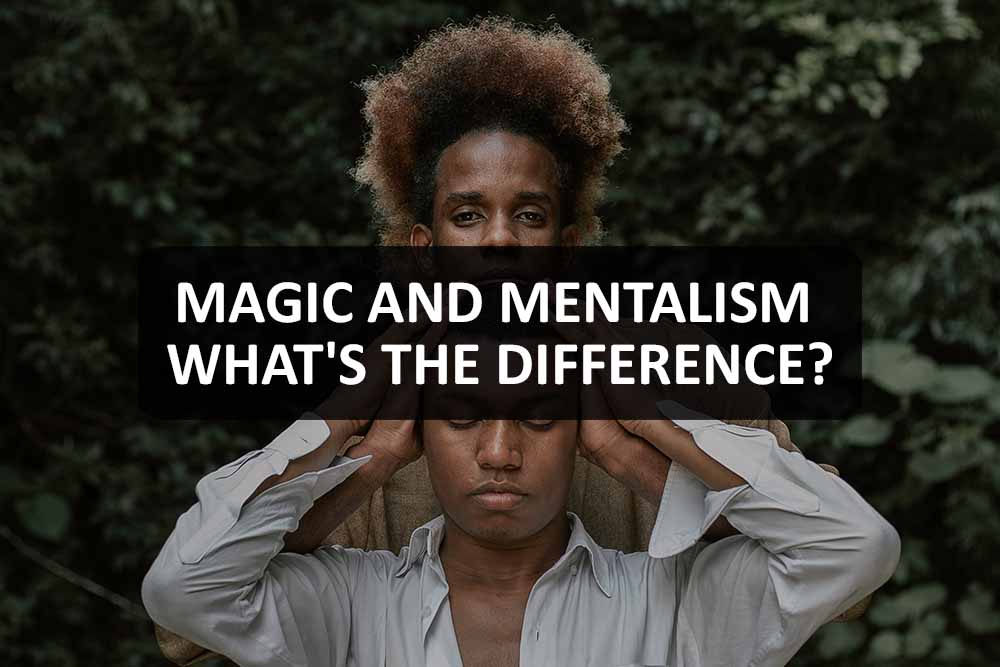Have you ever been a volunteer at a magic show and the performance involved “mind reading”?
Or perhaps you were asked to go up on stage to hold a card and the “magician” had to guess what it was that you were holding.
And every time, the magician perfectly guesses what your card was. You end up wondering, “Is this magic? Or is it mentalism?”
The two are continuously used together, it’s hard to tell which one is mentalism and which one is magic.
Well, that’s exactly what we’re going to be talking about here. We’re going to show you the differences between magic and mentalism.
We can all agree that both mentalism and magic are equally as mind-boggling and entertaining, and sometimes hilarious when pulled off successfully.
But here are the differences.
What are the Differences Between Magic and Mentalism?
People who are just dipping their toes into the world of magic and mentalism may get a bit confused, so we’re going to tackle their differences one by one, starting with magic.
Magic
Magic is the ability to trick your audience into believing something has happened when it hasn’t, usually through misdirection, mirrors, and other on-stage props.
A good example would be that little trick we pull on children where we pretend to dislocate our thumb using our other hand.
Not familiar with the trick? Check out this video:
Make sure to try this out with your toddler next time. It’s hilarious!
You can do the trick with other adults too. It’s still pretty funny, especially when there’s some alcohol involved.
Other “effects” of magic are:
- Causing items to vanish
- Teleportation
- Changing the colors, texture, etc. of objects
- Escaping acts
Now let’s talk about mentalism.
Mentalism
While magic involves sleight of hand, mentalism is a mixture of mind reading and psychic ability.

To be a good mentalist, you must be able to convince your audience that you have psychic powers or the ability to read minds. This means that you need to be really, REALLY good at observing and convincing people of whatever it is you’re trying to portray.
Mentalism is highly audience-centric. Meaning, it’s all about the audience and their thoughts.
A mentalist should also be sensitive to their audience’s micro-expressions and body language. This would require extensive knowledge and mastery of human psychology.
Some “effects” of mentalism are:
- Mind reading
- Future prediction
- Lie detection
- Psychological influence
How People See Magic vs How People See Mentalism
People respond to magic and mentalism differently. We know magic isn’t real, so we look forward to the entertainment value it will bring.
In reality, very few people in the world – excluding children – actually believe in the existence of magic.
When people go to magic shows, they know they’re in for a night of “trickery”. So all they will be focused on will be spotting the ways these magicians are performing these tricks.
In regards to mentalism, people are more inclined to believe that mind-reading is possible, or that there are people who possess psychic powers.
In fact, there is a whole industry dedicated to mentalism.
Wait, really?
Yep! PSYCHICS!
But what do psychics have to do with this?
Well, in order to capture their client’s attention and trust, psychics have learned to adopt the same or similar techniques that mentalists use.
So, in a way, psychics can be considered mentalists.
How People Perceive Mentalists and Magicians
Since you’ve gotten this far into the article, you may have noticed that people perceive mentalists and magicians differently as well.
Mentalists
When mentalists perform, everything is focused on the personal interaction between the mentalist and their audience.
Mentalists want their audience to believe in the possibility that they do possess the ability to read minds or that they have supernatural powers.
But even if their audience remains unconvinced, at the very least they want people to go home feeling bewildered, astounded, and with no explanation as to how the “mind tricks” were done.
Magicians
With magic, the objective of the performance is to leave people guessing how a “trick” or illusion was done.
Your audience – excluding youngsters – know it’s not real magic. So your goal would be to get people’s heads spinning at how they could have missed the sleight of hand or misdirection in your tricks.
Today, even young children have become more perceptive these days. So pulling bunnies out of a hat or changing the color of your handkerchief might not even impress them anymore.
So you’ll have to rely on being a little bit crafty.
Magicians Using Mentalism
Do magicians use mentalism?
Heck yeah, they do!
Well, at least now they do.
Okay, back then, there were some tension between mentalists and magicians.
Some mentalists looked down on magicians because they found their practice to be “not serious enough” or “child’s play”, while some magicians frowned upon mentalism because performances seemed “dishonest”.
Fortunately, nowadays magicians have started to study more on mentalism and integrate them into their performances to make them more entertaining for the audience.
This “merge” in the two different entertainment forms doesn’t lower the impact of mentalism! It just means that magic shows are going to have more “pizzazz” than they used to.
Mentalists “Using” Magic
Is it possible for mentalists to use “magic” in their performances?
Yes!
Magic shows are fun and filled with interesting props and the like.
Some mentalists nowadays use magic tricks to add some spice into their performances.
And besides, card tricks have always been a crowd favorite. So why not incorporate those into your show?
At the End of the Day
So, though magic and mentalism are somewhat similar (and both have even integrated the others trick), there are still differences that set the two apart.
For magic, magicians like to use sleight of hands and props to entertain the crowd. As for mentalism, they use observation and conviction to convince the audience that they can “read minds”.
To be sure, both are equally entertaining, funny, and mind-boggling.

